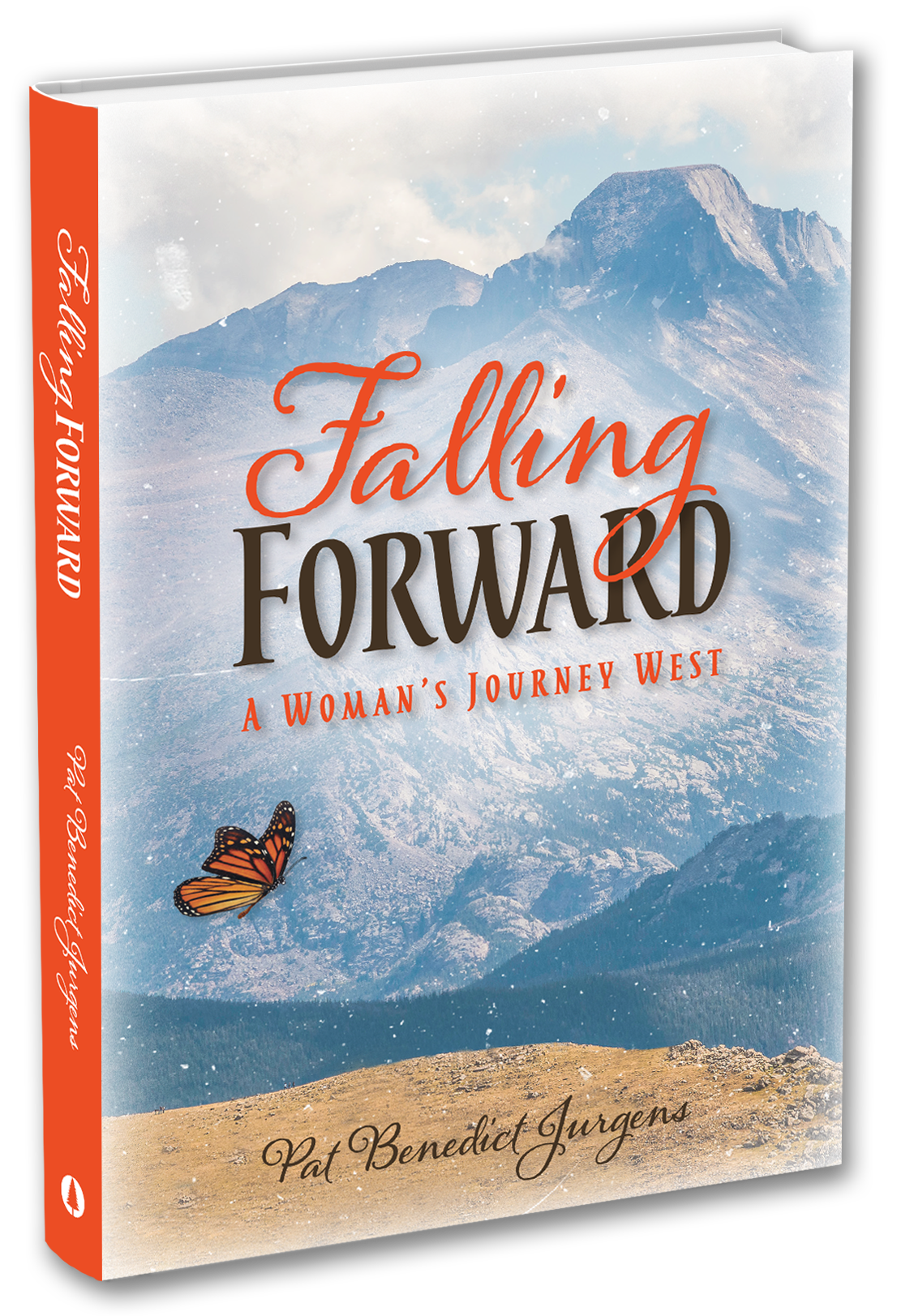Falling Forward, a Woman’s Journey West is coming-of-age literary fiction at its best and follows the saga of seventeen-year-old Louisa, a Mennonite farm girl living in 1890s Ohio.
Her dreams of travel and adventure seem impossible when her mother dies in childbirth, leaving her to care for her younger siblings as her father struggles to keep the farm running.
When he hires Thomas, an outsider to the Faith, to help on the farm, Louisa finds everything changed not just by her attraction to him, but the differences between her strict Mennonite upbringing and the challenges he poses to them as an outsider with very different beliefs and perspectives on life and God.
When her loving father agrees to their union, Louisa and Thomas thus begin their own journey, making many discoveries about themselves and each other along the way. They are challenged to create a life together in a community that has shunned them.
Pat Benedict Jurgens brings the times to life, as well as introducing the foundations of a Mennonite household and its Germanic heritage. Her attention to detail includes dialogue between father and daughter which captures these foreign flavors while keeping the story understandable: “I haf lost face in de church, but still haf my daughter. Vith a strong-headed girl like you, dat is victory.” She looked up with an uncertain smile, but didn’t say anything. “Nineteen years you are, a voman grown, and one who knows her own mind.” Louisa’s fingers stopped sewing to take in his words: “I hope it nein vill land you in too much trouble.”
When yet another tragedy strikes, the headstrong and determined Louisa is challenged to continue her foray into the world alone: “…outdoors in the natural world, grass along the walk greened, crocuses and then daffodils pushed their way up from the earth. The scent of earth and early blossoms permeated the air. Looking at the buds on the big cottonwood tree in the yard, Louisa saw the world awakening. Gradually she began to feel that life was for living.”
Jurgens adds many observations about women’s roles during this era, in these wild places and times: “A woman’s livelihood hinged on either having a husband or enough money to be independent.” But Louisa is not the kind of woman to remain quietly true to her assigned role even as a bank president stymies her proposal: “I don’t doubt your capability, Miss. And I admire your enthusiasm, but starting a business is a man’s job. If your husband were alive, I doubt that he’d agree to your ambitions. I understand you need to make a living, but perhaps something you could do at home would be more seemly. A store run by a woman? Pardon me, but a man’s head for commerce is needed for an endeavor of this magnitude.”
Readers who anticipate the journey of another pioneer girl will find this coming-of-age story offers so much more as Louisa’s ventures in the West evolve from travel to business to enter another forbidden circle, politics, which brings with it a blossoming women’s suffrage movement.
All these elements are presented in a warm, involving story that is a delight to read. The personal growth of a homebody and feisty girl into a determined woman who falls into a role of advocating for social change is well done and compelling.
Women’s fiction readers who seek more than adventure alone will welcome Louisa’s story of social, political, and personal transformation.

 I so admire authors who can take a piece of history and create a wonderful ‘herstory’ around it. That’s what Pat Benedict Jurgens has done with Falling Forward: A Woman’s Journey West, her story of Louisa, a courageous and sometimes feisty member of a Mennonite community back in 1897. While Louisa loves and respects her austere, hard-working father, a community elder, after her mother dies Louisa is forced into looking after her siblings and the household needs. She does so unbegrudgingly, but after marrying a non-Mennonite and becoming increasingly unhappy with the restrictions of her community, she and her beloved husband leave to make their future elsewhere. The move proves fatal in more ways than one and Louisa finds herself raising her two children alone. But if nothing else, Louisa is resourceful. She is also a free thinker and believes what men can do…like run a business… she can do. She opens a successful bakery and joins other forward-thinking women looking to gain equality. But the men are there at every turn, doing their best to oppose such women and make sure they know their place.
I so admire authors who can take a piece of history and create a wonderful ‘herstory’ around it. That’s what Pat Benedict Jurgens has done with Falling Forward: A Woman’s Journey West, her story of Louisa, a courageous and sometimes feisty member of a Mennonite community back in 1897. While Louisa loves and respects her austere, hard-working father, a community elder, after her mother dies Louisa is forced into looking after her siblings and the household needs. She does so unbegrudgingly, but after marrying a non-Mennonite and becoming increasingly unhappy with the restrictions of her community, she and her beloved husband leave to make their future elsewhere. The move proves fatal in more ways than one and Louisa finds herself raising her two children alone. But if nothing else, Louisa is resourceful. She is also a free thinker and believes what men can do…like run a business… she can do. She opens a successful bakery and joins other forward-thinking women looking to gain equality. But the men are there at every turn, doing their best to oppose such women and make sure they know their place.